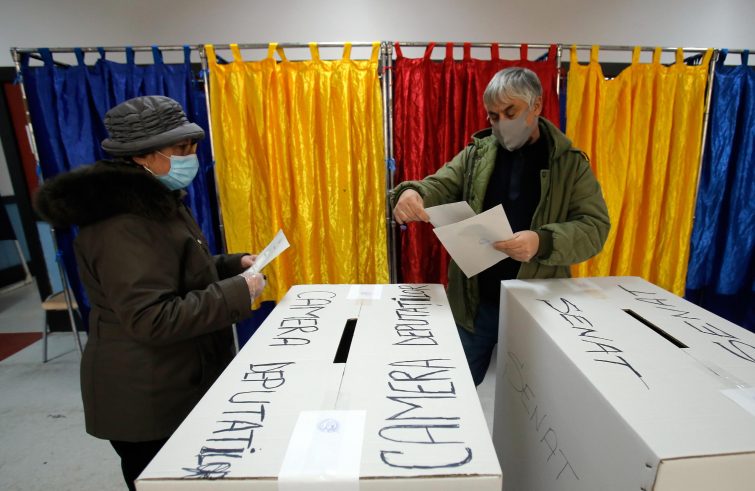
Romanian citizens voted in parliamentary elections last Sunday. As the polls closed, and the ballots counted, observers noted the record-low turnout, which, they claimed, calls into question the level of representation of a parliament elected by 32% of those entitled to vote. The Country is also discussing the appearance on the political scene of a self-described “Christian party” but considered extremist. Romanian president Klaus Iohannis hopes to form a centre-right coalition government, despite the aspirations of the centre-left, which won a narrow lead.
The lesson of the electorate. Slightly more than two months since last September’s local elections, when more than 45% of Romanians had cast their votes, parliamentary elections registered a record-low turnout. The pandemic and the bad weather discouraged a number of voters, but the Romanian president sees the low turnout as a lesson from the electorate: “it is very clear that there are many Romanians who either did not receive enough information or are dissatisfied with me, the parties, the political class, or certain measures that were taken”, Klaus Iohannis said commenting on the election results.
In fact, three Romanian provinces, greatly affected by the measures taken by the government to cope with the pandemic – Suceava, Iași and Prahova – have changed their political orientation in two months, switching from the centre-right to the centre-left coalition.
Moreover, the fact that almost half of all mail ballots didn’t arrive raised quite a few questions regarding the legitimacy of the electoral process. In addition, the election campaign was toned-down due to the pandemic, and on this occasion also the Churches remained silent. In fact, while in past elections the Romanian Orthodox Church and the Catholic Church encouraged voter participation, this time the message was only reiterated by some Catholic bishops, notably those of the Hungarian-speaking of Latin Catholic dioceses.
The “surprise Party”. Although the low turnout was rather unexpected, the greatest surprise of these elections is the entry into parliament of the Unification of Romania Alliance (AUR), created in December 2019. Ignored by media outlets during the election campaign, the “surprise party”, as it was dubbed right after the first election polls, outperformed traditional parties long present on the political stage, winning approximately 9% of the vote (more than 20% of votes cast by Romanians abroad, especially those living in Italy and Spain). The self-proclaimed Christian and conservative party AUR, whose doctrine is based on four pillars – family, homeland, faith and freedom -, is branded by Romanian news media as an extreme-right party, owing to the speeches – deemed ultranationalist, anti-European, homophobic and intolerant – of its leaders. Several members of the party came from the Coalition for the Family, the movement that promoted the 2018 referendum to change the definition of the family in the Romanian Constitution, eventually rejected by the electorate. “We are the defenders of the Church”, said Claudiu Tarziu, co-chairman of the party and former journalist close to the Romanian Orthodox Church, after the closing of the polls on Sunday. “We are those who stand for the great Romania”, i.e., for the unification of the Republic of Moldova with Romania. “Ours is the only political party that spoke out in support of Donald Trump. We support the sovereignists, not the globalists”, he added. ” We shall see what they will do”, Monsignor Aurel Perca, Roman Catholic Archbishop of Bucharest, told SIR, adding that he had heard about AUR only a few days before the elections. “If they have sound principles concerning the family and ethics, in general, it will be a good omen and will restore balance, as opposed to the blunders of other parties who occasionally neglect moral principles.”
Catholics in politics. Although Romania is a Country with an Orthodox majority, increasing numbers of Catholics are actively involved in the social life of the country, both in local administration and in national politics.
“I welcome the fact that a number of Catholics have entered the political arena,” Archbishop Perca told SIR, “including a minister in the incumbent government, along with Senate and Chamber deputies who ran for office in these elections. I have personally encouraged Catholics, especially when I had the opportunity to meet members of Catholic Action, to have the courage to engage in politics thereby compounding the formation in social doctrine offered by the Church. We hope that their numbers may increase even in parliament, and that they may have the courage to take a stand when it comes to matters that concern the Church.”
After the elections. With 96% of ballots counted, it is clear that the Romanian parliament will be composed of five political formations: The Social Democratic Party (PSD), centre-left, that garnered about 29% of the vote; the National Liberal Party (PLN), centre-right, with 25%; the Alliance between Save Romania Union – Freedom, Unity and Solidarity Party – (centre-left USR-PLUS, centrist), with about 15% of the vote; the Alliance for the Unity of Romanians – AUR, close to 9%; and the Magyar Democratic Union of Romania – UDMR, centre-right, with 6%. The Prime Minister of Romania, PNL leader, resigned on Monday evening. President Klaus Iohannis appointed as interim Prime Minister the Minister of Defense, General Nicolae Ciuca. In a statement released the same day, the Romanian president voiced the hope for a center-right government, even though the Social Democrats claim the leadership and the formation of the new government.
Negotiations and pandemic… Negotiations between party representatives and President Iohannis will start next week, and a new government will be formed after December 21. Meanwhile, Christmas is near, and a number of religious communities, in quarantined locations due to the pandemic, are required by the local authorities to celebrate it outdoor, even though Romania is now experiencing full winter, with snow and below zero temperatures. The partial lockdown will be extended and as of January the new parliament is expected to organize the vaccination campaign against COVID-19 and respond to the economic and social crisis caused by the pandemic.








